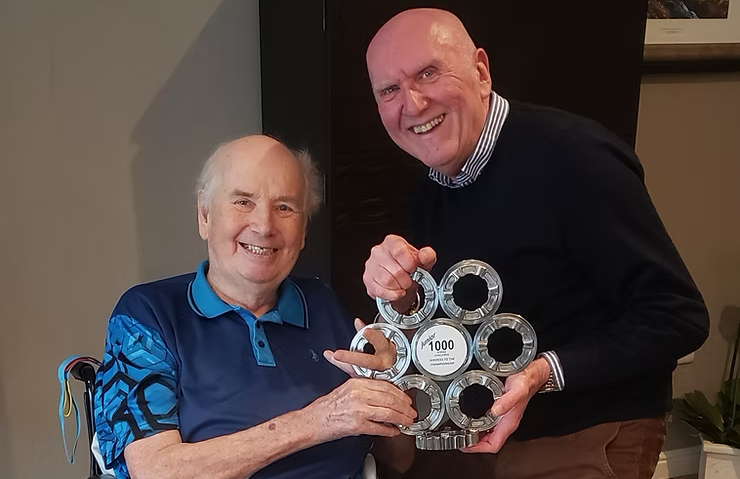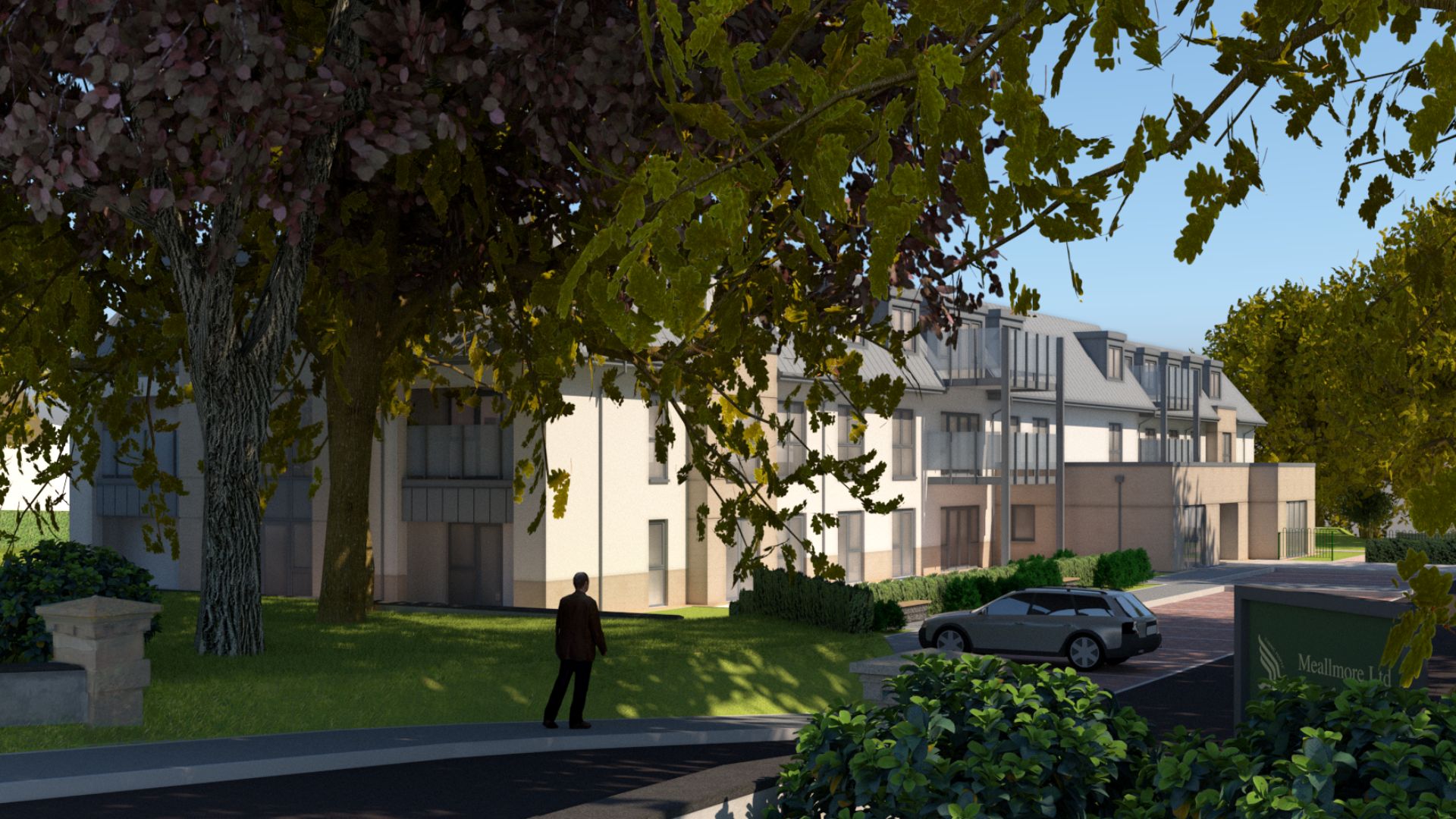Greenan Manor in Doonfoot hosted a special celebration for resident Roy Campbell, honouring his lifelong contribution to the Scottish Rally Championship.

The Importance of Family Bonds in Care Homes
A Comprehensive Perspective from Meallmore
Recent research from the University of Leeds has shed light on the significant impact that family-like bonds between care home staff and residents have on the quality of care. This comprehensive study highlights the necessity of stable, consistent staffing and the empowerment of care home workers to foster these essential relationships. At Meallmore, these findings resonate deeply with our philosophy and practices. This article delves into the research, its implications, and how Meallmore strives to embody these principles to enhance the lives of our residents.

Understanding the Research
The study, titled "Understanding the Staffing Relationship to Quality in Care Homes: the StaRQ Mixed-Methods Study," conducted by the University of Leeds, explored how staffing stability and the development of familial bonds between staff and residents influence the quality of care in care homes. The research team analysed various data sources, including reports and ratings from the Care Quality Commission (CQC), journal articles, and care home data.
Key findings from the study include:
- Homes with stable and consistent staffing were more likely to receive positive CQC ratings.
- Staff who had been in their positions for extended periods could form stronger bonds with residents, leading to better care outcomes.
- Empowering staff and providing them with autonomy improved their ability to deliver personalised care.
These findings underscore the importance of treating care home teams as integral parts of the residents' extended families, creating an environment where trust, familiarity, and genuine relationships can flourish.

The Meallmore Approach
At Meallmore, we have always prioritised creating a nurturing and supportive environment for both our residents and colleagues. Our approach aligns closely with the study's recommendations, focusing on several key areas:
- Stable and Consistent Staffing:
- We believe that consistency in staffing is crucial for building trust and fostering relationships. Our efforts to maintain low staff turnover rates ensure that residents receive care from familiar faces, which helps in creating a sense of stability and security.
- We believe that consistency in staffing is crucial for building trust and fostering relationships. Our efforts to maintain low staff turnover rates ensure that residents receive care from familiar faces, which helps in creating a sense of stability and security.
- Empowerment and Support for Staff:
- Empowering our teams with the necessary resources, training, and autonomy is fundamental to our approach. By supporting our care workers, we enable them to provide personalised, compassionate care that meets the unique needs of each resident.
- Empowering our teams with the necessary resources, training, and autonomy is fundamental to our approach. By supporting our care workers, we enable them to provide personalised, compassionate care that meets the unique needs of each resident.
- Leadership and Recognition:
- Strong leadership and recognizing the contributions of our staff are vital in maintaining high morale and a shared commitment to quality care. We celebrate the achievements of our team and encourage a culture of continuous improvement.
- Strong leadership and recognizing the contributions of our staff are vital in maintaining high morale and a shared commitment to quality care. We celebrate the achievements of our team and encourage a culture of continuous improvement.
- Family-Like Atmosphere:
- Creating a family-like atmosphere within our care homes is central to our philosophy. We strive to build a community where residents feel valued, respected, and loved, just as they would in their own families.

The Role of Family Bonds in Enhancing Care
The research highlights the profound impact that family-like bonds can have on the well-being of care home residents. These bonds are not only crucial for emotional and psychological health but also for improving the overall quality of care. When staff and residents develop close, familial relationships, several positive outcomes emerge:
- Improved Emotional Well-Being:
- Residents who feel emotionally connected to their caregivers experience higher levels of happiness and satisfaction. These relationships provide a sense of belonging and reduce feelings of loneliness and isolation.
- Residents who feel emotionally connected to their caregivers experience higher levels of happiness and satisfaction. These relationships provide a sense of belonging and reduce feelings of loneliness and isolation.
- Better Communication and Understanding:
- Familiarity between staff and residents enhances communication, allowing caregivers to understand the individual needs and preferences of each resident better. This understanding leads to more personalised and effective care.
- Familiarity between staff and residents enhances communication, allowing caregivers to understand the individual needs and preferences of each resident better. This understanding leads to more personalised and effective care.
- Increased Trust and Security:
- Trust is a fundamental component of any caring relationship. When residents trust their caregivers, they are more likely to feel safe and secure, which is essential for their overall well-being.
- Trust is a fundamental component of any caring relationship. When residents trust their caregivers, they are more likely to feel safe and secure, which is essential for their overall well-being.
- Enhanced Quality of Life:
- The study found that care homes with stronger family-like bonds tended to have higher CQC ratings and fewer adverse incidents such as falls and medication errors. This correlation underscores the link between strong relationships and high-quality care.

Practical Applications at Meallmore
Meallmore is committed to implementing the insights from this research to further enhance the care we provide. Here are some of the practical steps we are taking:
- Investing in Staff Development:
- Continuous training and professional development are essential for maintaining a skilled and competent workforce. We provide regular training sessions and opportunities for our colleagues to expand their knowledge and skills.
- Continuous training and professional development are essential for maintaining a skilled and competent workforce. We provide regular training sessions and opportunities for our colleagues to expand their knowledge and skills.
- Fostering a Supportive Work Environment:
- We prioritise creating a supportive and collaborative work environment where colleagues feel valued and appreciated. Regular team-building activities and open communication channels help in building a cohesive team.
- We prioritise creating a supportive and collaborative work environment where colleagues feel valued and appreciated. Regular team-building activities and open communication channels help in building a cohesive team.
- Encouraging Resident and Family Involvement:
- Involving residents and their families in care planning and decision-making is crucial. We hold regular meetings and events that encourage family participation, strengthening the bonds between residents, their families, and our care teams.
- Involving residents and their families in care planning and decision-making is crucial. We hold regular meetings and events that encourage family participation, strengthening the bonds between residents, their families, and our care teams.
- Promoting Stability and Consistency:
- We strive to maintain stability in staffing by offering competitive salaries, benefits, and a positive work environment. This approach helps in reducing staff turnover and ensuring that residents receive care from familiar and trusted caregivers.

Case Studies and Success Stories
To illustrate the impact of our approach, here are a few success stories from Meallmore, names have been protected to provide anonymity:
- Mary's Story:
- Mary, a long-term resident at one of our care homes, has developed a close bond with her caregiver, Sarah. This relationship has significantly improved Mary's quality of life. She looks forward to her daily interactions with Sarah, who understands her preferences and needs intimately. The trust and familiarity between them have transformed Mary's experience, making her feel more at home.
- Mary, a long-term resident at one of our care homes, has developed a close bond with her caregiver, Sarah. This relationship has significantly improved Mary's quality of life. She looks forward to her daily interactions with Sarah, who understands her preferences and needs intimately. The trust and familiarity between them have transformed Mary's experience, making her feel more at home.
- John's Experience:
- John, who initially struggled with the transition to a care home, found comfort in the consistent presence of his caregiver, Alex. Over time, Alex's support and understanding helped John adapt to his new environment. Their relationship has flourished, and John now actively participates in various activities, feeling more engaged and happy.
- John, who initially struggled with the transition to a care home, found comfort in the consistent presence of his caregiver, Alex. Over time, Alex's support and understanding helped John adapt to his new environment. Their relationship has flourished, and John now actively participates in various activities, feeling more engaged and happy.
- Family Engagement in Emily's Care:
- Emily's family plays an active role in her care, regularly visiting and participating in care planning meetings. This involvement has strengthened the bond between Emily, her family, and the care staff. The collaborative approach ensures that Emily's care is tailored to her needs, enhancing her overall well-being.

Future Directions and Continuous Improvement
At Meallmore, we are committed to continuous improvement and innovation in our care practices. The insights from the University of Leeds study provide valuable guidance for our future initiatives. We plan to:
- Expand Training Programs:
- We will continue to expand our training programs, focusing on building skills that enhance the ability of our staff to form and maintain family-like bonds with residents.
- We will continue to expand our training programs, focusing on building skills that enhance the ability of our staff to form and maintain family-like bonds with residents.
- Enhance Support Systems:
- Strengthening our support systems for colleagues, including mental health resources and peer support networks, will ensure that our caregivers feel supported and valued.
- Strengthening our support systems for colleagues, including mental health resources and peer support networks, will ensure that our caregivers feel supported and valued.
- Innovate Care Practices:
- We will continue to explore innovative care practices that promote strong relationships, such as personalised care plans, resident-focused activities, and new technologies that facilitate better communication and engagement.
- We will continue to explore innovative care practices that promote strong relationships, such as personalised care plans, resident-focused activities, and new technologies that facilitate better communication and engagement.
- Monitor and Evaluate Outcomes:
- Regular monitoring and evaluation of care outcomes will help us identify areas for improvement and measure the impact of our initiatives on the quality of care.
- Regular monitoring and evaluation of care outcomes will help us identify areas for improvement and measure the impact of our initiatives on the quality of care.
The importance of family bonds in care homes cannot be overstated. The recent research from the University of Leeds highlights the critical role these bonds play in enhancing the quality of care and the well-being of residents. At Meallmore, we are dedicated to fostering these relationships through stable staffing, empowerment of our caregivers, and creating a supportive, family-like environment. By continuing to prioritise these principles, we aim to provide the highest standard of care and improve the lives of our residents every day.
For further information and insights into the research, you can read the full study on Medical Xpress.
Stay Connected with Meallmore
We’re committed to sharing knowledge, advice, and updates from across our care homes and the world of care. Read our latest articles, resident stories, and company updates.


Celebrating one year of Kelvinside Manor Care Home, delivering exceptional care, community connection and a true home-from-home in Glasgow’s West End.

Sutherland House is a new purpose-built care home in Broughty Ferry, opening in early 2027 with residential, nursing and dementia care in a coastal setting.
.png)